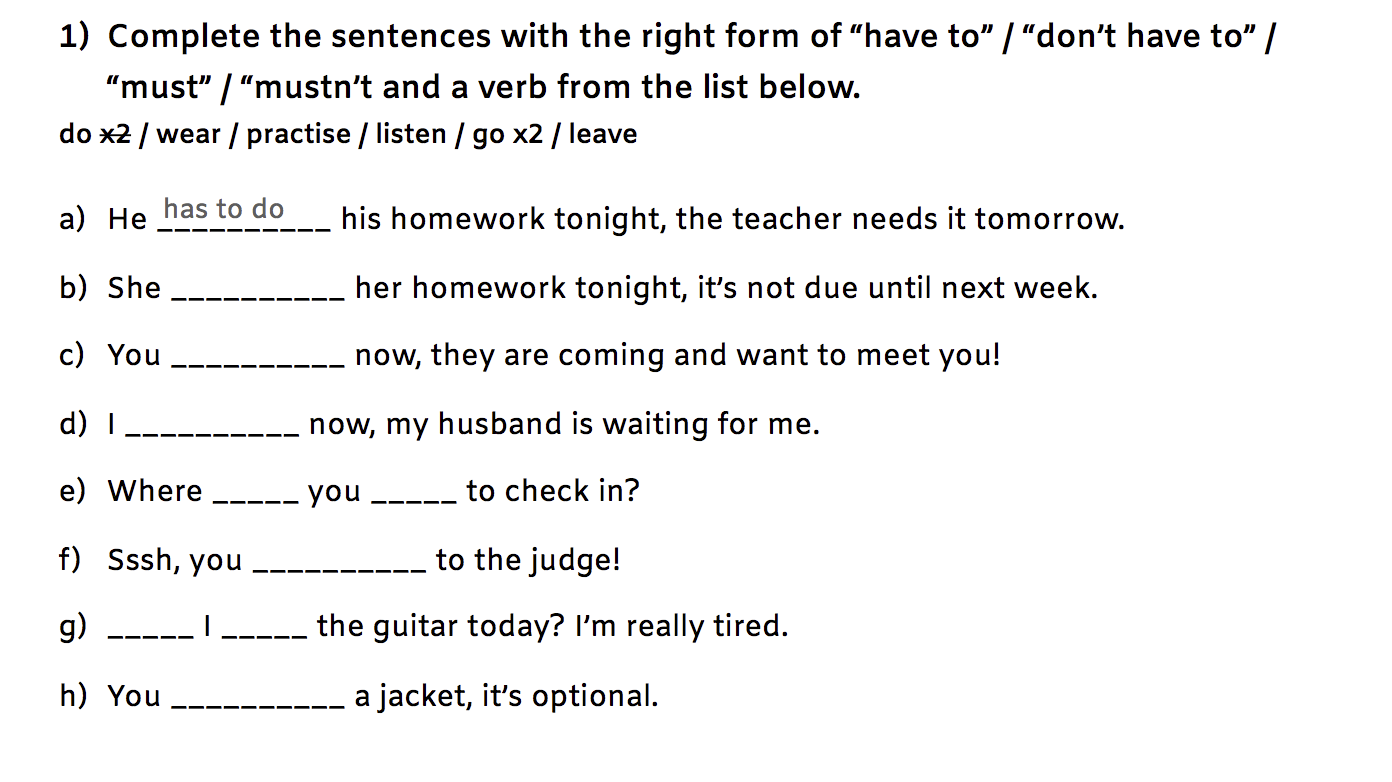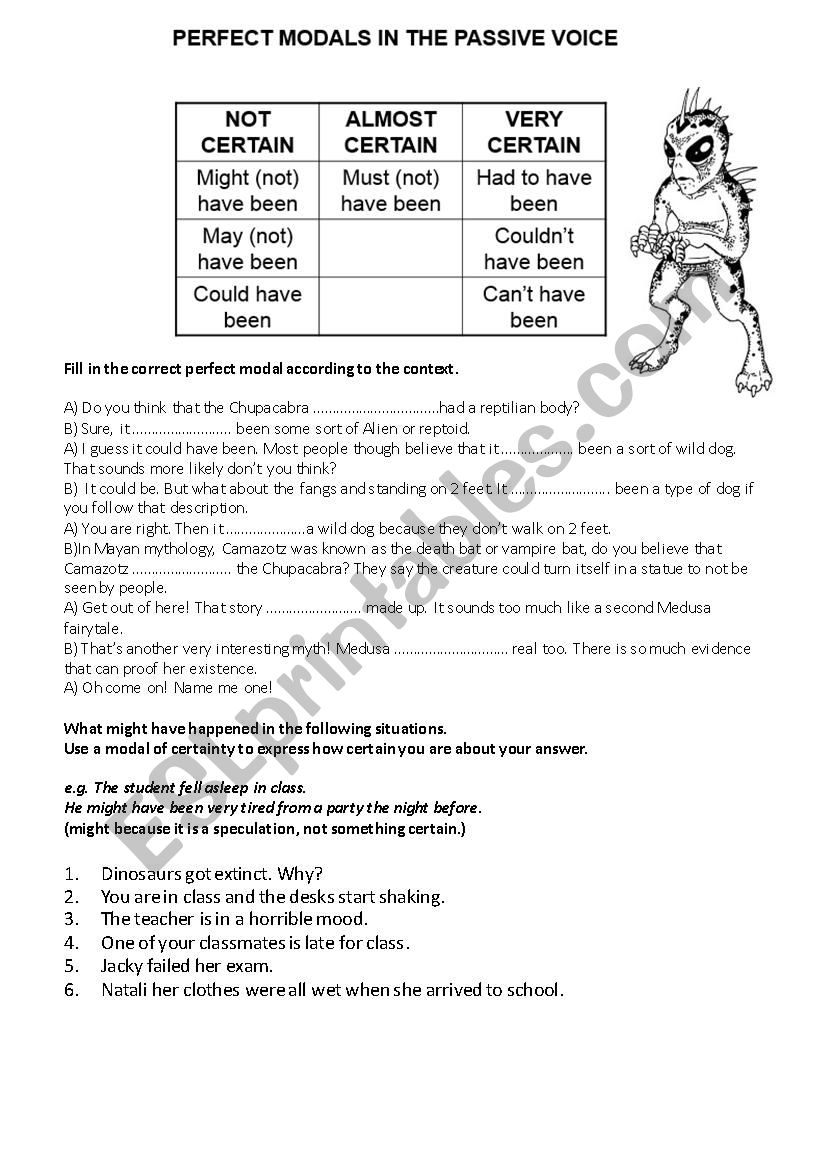

We also use modal verbs to say something is not allowed. We can use verbs such as 'can', 'could' and 'may' to ask for and give permission. We can use verbs such as 'must' or 'should' to say when something is necessary or unnecessary, or to give advice.Ĭlick here to find out more about obligation Permission My grandfather could play golf very well.Ĭlick here to find out more about ability.We use 'can' and 'could' to talk about a skill or ability. £200 for two cups of coffee!Ĭlick here to find out more about probability. It's snowing, so it must be very cold outside.We often call these 'modals of deduction' or 'speculation' or 'certainty' or 'probability'. Probability:įirst, they can be used when we want to say how sure we are that something happened / is happening / will happen. Here's a list of the modal verbs in English: canġ: They don't use an 's' for the third person singular.Ģ: They make questions by inversion ('she can go' becomes 'can she go?').ģ: They are followed directly by the infinitive of another verb (without 'to').

'I might (do)'.Click here for all the exercises about modal verbs Modal verb with do (particularly in spoken English). Modal auxiliary verb (can, could, may, might, must, ought to, shall, should, will, would) Modal with be(the verb can't be left out) Verb to be or verb to be as the auxiliary verb within a passive I am not walking up the mountain, but my brother is. 'Of course you didn't'.Īuxiliary verb 'have' either followed or not followed by 'done'. 'Do you think she has a chance of coming first?'. The shortened form of the 2 auxiliary verbs, either the first or both, can be usedĬinderella hadn't been invited to the ball, but her ugly sisters had (or had been). Here is a table to help you master these rules: Will you see Tony tonight? I might see Tony tonight. Where a modal auxiliary verb (can, could, may, might, must, ought to, shall, should, will, would) is the auxiliary verb, we can use do (particularly in spoken English). Where have is the auxiliary verb, we can follow the auxiliary verb 'have' by 'done' in the second sentence. The shop said it would be delivered within a week. Where the verb to be is the main verb or the auxiliary verb within a passive in the previous sentence, we use a modal with be (which can't be left out). Is Ella staying for dinner? Yes I think she will be.

Is Ella staying for dinner? Yes I think she will. Is Ella staying for dinner? Yes I think she is staying for dinner. Where the verb to be is the auxiliary verb in the previous sentence, we can use a modal verb with or without be and the second sentence is shortened to either of the two examples below. I am not walking up the mountain, but my brother is walking up the mountain. Where the verb to be is the main verb in the previous sentence, we repeat a form of the verb be in the second sentence 'Do you think she has a chance of coming first?' 'Yes she has.' 4. 'Do you think she has a chance of coming first?' 'Yes I do.' 'Do you think she has a chance of coming first?' 'Yes I do think she has a chance of coming first.'Ĭould become either of these more concise versions Where 'have' is the auxiliary verb in the first sentence, either 'to have' or 'to do' are used as the auxiliary verb in the second sentence

'I now run faster than he does.' 'Of course you do.' 3. 'I now run faster than he does.' 'Of course you run faster than he does.' Where there is no auxiliary verb in the first sentence or there is a form of the auxiliary do, 'to do' is used as the auxiliary verb for the second sentence Where 2 auxiliary verbs are used, the shortened form can use either the first or both in the second sentenceĬinderella hadn't been invited to the ball, but her ugly sisters had been invited to the ball.Ĭinderella hadn't been invited to the ball, but her ugly sisters had.Ĭinderella hadn't been invited to the ball, but her ugly sisters had been. In a longer expression, instead of repeating two verbs, we might use an auxiliary verb on its own in the second sentence or phrase. Leaving words out after auxiliary verbs: Explanation and use We have the grammar rules and a few exercises for you. In example 2 the auxiliary verb 'are' remains in the second sentence but the second verb 'singing' has been removed leaving the sentence group more concise. We use the auxiliary verb 'are' (to be) with 'singing' in the sentence group below but in example 1 the second sentence is too long and cumbersome. Leaving out words after an auxiliary verb allows us to avoid repeating whole verb groups from previous sentences.ġ.


 0 kommentar(er)
0 kommentar(er)
